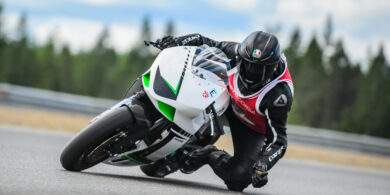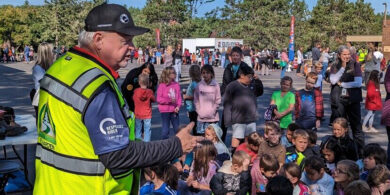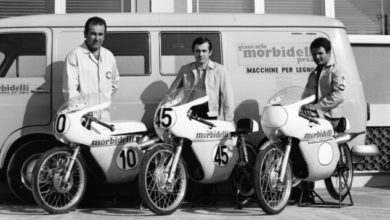The basics of kart retailing in the U.S.
By Guido Ebert
Associate editor
A motorcycle dealer for over 30 years, Jim Boltz operates the CycleBarn Motorsports Superstores, two dealerships located in Lynnwood and Smokey Point, Wash. Cycle Barn is one of the top 25 largest Harley-Davidson dealerships in the world, in the top five Triumph dealers in the U.S., and also carries Honda, Kawasaki, Polaris, Yamaha and Arctic Cat.
The owner of SSC Racing — the successful race kart firm led by Joe Ramos (see Race Karts, Page 12) — Boltz once thought go-karts would be a lucrative addition to his CycleBarn dealerships. A couple of years ago, using the 50,000 sq. ft. Lynnwood location, he positioned his selection of race karts and fun karts on the showroom floor next to CycleBarn’s traditional powersports equipment.
“We fell flat on our face,” Boltz recently told Powersports Business, going on to explain how he learned that the key to success was a division of the product. “ I brought a guy in who was a karting guy, and we moved the karts from the Lynnwood facility into a new building on the property. Now, dealing out of our karting center, we carry racing karts, fun karts and powered scooters — units I could never sell in the motorcycle store.”
He says those items, all sold from The Karting Center at the Lynnwood CycleBarn, combined to generate over $1 million in sales last year.
“The fun kart, like the product from Carter Brothers, is really a mainstream product that a motorcycle dealer can carry and be successful with,” Boltz explains. “The race karts, however, represent a very unique niche market. It’s strictly a racing enterprise, and it’s not just something you plug into a motorcycle dealership and expect to be successful with.”
Margins, he says, “are similar to what a dealer gets in the non-Harley biz” — anywhere from 15% to 20% for the karts, and 30% to 40% for parts and accessories.
Mark Dismore, Jr. is a third-generation kart retailer and operates Comet Kart Sales in Greenfield, Ind.
“Karters have become smarter over the years, and they all demand a bit of customer service involved with their purchases,” Dismore said. Good service, he said, comes from knowledge garnered at the track, where a dealer should spend time and offer support. “If you’re a dealer and you don’t really know anything about the chassis, you can’t help anyone. These aren’t machines someone is going to buy to drive around in the driveway or yard; these are things people compete with.”
A manufacturer, importer and retailer, Comet produces a chassis line branded Edge Karts, imports parts and accessories from England and Italy, and performs tech services. Most of Comet’s business comes from telephone sales, but Dismore says his firm also deals over-the-counter and via the Internet.
“We sell customers things like a $1,000 set of scales, laser alignment kits, $600 tach/temp gauges that you can download to look at traces on rpm and wheel speed and gearing; everything is just becoming a lot more sophisticated than people may think,” he said.
Steve Patrick of CompCor Distribution, the Scottsdale, Ariz.-based importer of Tony Kart product from Italy, said the “sophisticated” product Dismore spoke of isn’t often sold by even the most sophisticated of dealers.
“The karting industry is a lot like the motorcycle industry was 25 years ago,” Patrick told Powersports Business. “Right now, the typical kart dealer is a guy who started off as a racer and then subsidized his racing through a business in karting.” Patrick also warns that many importers followed a similar path to support their racing habits.
“There are a lot of importers who use the money from their retail sales to order more product, causing you to wait months for your order,” he said. “That’s not the way to go. Dealers should make sure that the importer or distributor they work with has in-stock machines and parts.”
SSC Racing’s Joe Ramos, himself a former motorcycle dealer, is “taking a lot of what are basics for the motorcycle industry and transferring it” to SSC’s business formula. He says traditional powersports retailers can find success in kart sales.
“Can powersports dealers pick up and successfully retail racing karts? The answer is absolutely yes,” Ramos said. “However, the key is that the dealer needs to make commitments: he needs to commit to stock inventory; commit to be at the track every weekend with a trailer, parts and support; and commit to a local club. If he does those three things, he will be successful in achieving incremental profits.”




